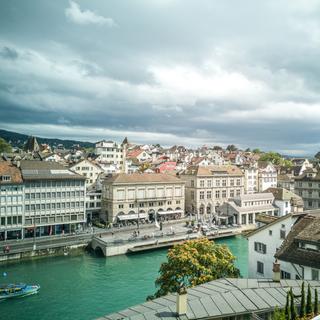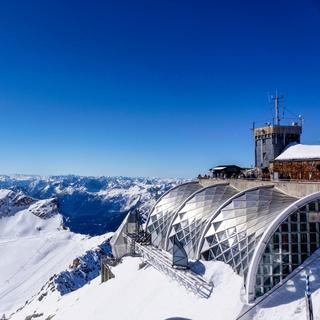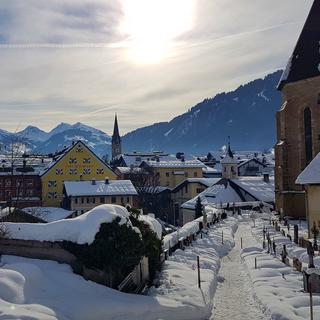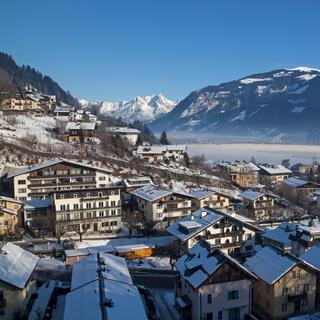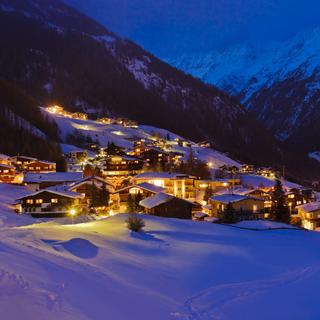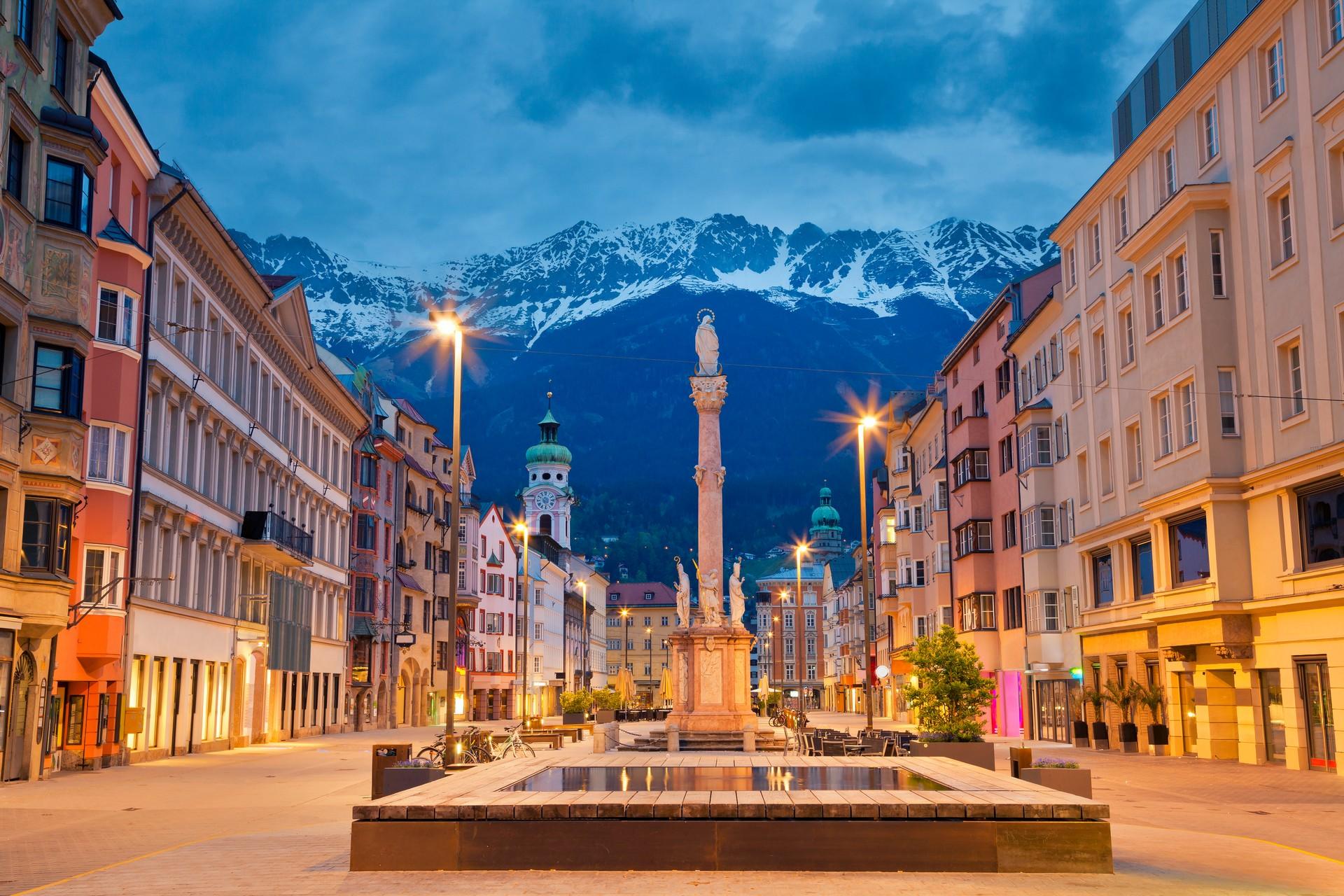
Innsbruck weather and climate

Innsbruck weather and climate
Day
24 °C
Night
12 °C
Precipitation
140 mm
in month
Rainy days
17 days
in month
Daylight
15 hours
average
Sunshine
7 hours
average
Humidity
70 %
Weather charts for Innsbruck

Find more destinations like this
Destinations with similar weather to Innsbruck
Other destinations in Alps - Austria
Closest cities for Innsbruck
Last week's weather in Innsbruck
Average daily temperature during the week of 23 June 2025 - 29 June 2025 was 31 �°C (88 °F), average minimal (night) temperature was 17 °C (63 °F). The current temperatures are above the long-term average for Innsbruck, with the daily and nighttime temperatures being 23 °C (73 °F) and 11 °C (52 °F), respectively. The coldest day of the week was Friday in the end of the week. The average temperatures observed during different times of day (based on local time) were as below: 7am 20 °C (68 °F), 10am 25 °C (77 °F), 1pm 29 °C (84 °F), 4pm 28 °C (82 °F), 7pm 27 °C (81 °F), 10pm 22 °C (72 °F).
There were 4 days without rain, 1 day with light rain, 1 day with moderate rain and 1 day with heavy rain during this week. Innsbruck received 45 mm (1.77 in) of precipitation throughout the week, which is above its long-term average of 30 mm (1.18 in). From dawn to dusk, there was an average of 38 % cloud coverage during the day.
An average wind speed of 1.9 m/s was recorded. North and East were the dominant wind direction(s). The atmosferic pressure ranged from 1014 hpa to 1029 hpa. The average air humidity was 61 % in Innsbruck.
During the daytime (from dawn to dusk), there were in average: 8 hours clear skies, 3 hours partially overcast skies, 4 hours overcast skies and 2 hours rainy weather. Average time of sunrise was 05:19, average time of sunset was 21:14.
Weather overview for Innsbruck
Weather overview
Innsbruck, a city nestled in the heart of Austria, is known for its temperate weather conditions. Across the year, daily high temperatures vary from a brisk 4 °C (39 °F) in the chill of January, warming up to a balmy 24 °C (76 °F) in the height of July. During the year, the lowest nighttime temperatures dip to -5 °C (24 °F) in January, while July evenings enjoy the highest temperatures, peaking at 12 °C (54 °F). The monthly rainfall patterns show October as the driest month with just 10 days of precipitation, while June brings the most rain, soaking the city for 18 days. This report presents weather statistics, making sure to cover aspects such as humidity, wind speed, hours of sunlight, rain days, and other relevant atmospheric measures.
January weather
January in Innsbruck marks the coldest temperatures with daytime lows reaching 4 °C (39 °F) and nighttime temperatures plunging to -5 °C (24 °F). The rainfall is in a gradual decline, settling at 50 mm (1.99 in).
February weather
As the calendar turns to February, the day and night temperatures in Innsbruck start to ascend slightly. A noticeable reduction in rainfall to 47 mm (1.85 in) is evident, along with an incremental increase in sunlight hours to 4 hours.
March weather
March ushers in a noticeable increase in Innsbruck's daytime temperature, now at 10 °C (50 °F), while nighttime temperatures also rise. An uptick in rainfall is seen, with a total of 12 days of rainy days. Meanwhile, the duration of sunshine extends to 5 hours.
April weather
April brings a continued increase in day temperatures reaching 14 °C (57 °F) in Innsbruck, with the night temperature climbing as well to 2 °C (36 °F). The amount of sunshine steadily rises, and the lowest humidity levels can be observed. Notably, wind speeds reach their peak at 2.
May weather
May sees the upward trend in day temperatures continue, reaching 19 °C (67 °F) in Innsbruck, and night temperatures also proceed to rise to 7 °C (45 °F). The early signs of an increase in rainy days are noted, adding up to 15 days, along with the initial rise in rainfall volume at 95 mm� (3.74 in). Additional sunlight hours, now at 6 hours, highlight the extended days.
June weather
June sees the day temperature reaching 22 °C (72 °F) as the night temperature also edges upwards to 10 °C (50 °F). The advent of the wet season registers with increased rainfall at 122 mm (4.82 in) and the maximum number of rainy days at 18 days. Sunshine hours in June follow the previous month's trend, being measured at 6 hours.
July weather
July experiences the pinnacle of day temperatures at 24 °C (76 °F), while nights are the warmest in the year too, at 12 °C (54 °F). A subtle decline in the number of rainy days to 17 days is seen, though the peak rainfall volume of 140 mm (5.53 in) hints at a wet season nearing its height. The maximum of sunshine hours, at 7 hours, is noticeably present.
August weather
August marks the start of a downturn in day temperatures in Innsbruck. The wet season's presence is still felt, and the tourist season is swinging into full gear. Rainfall begins to lessen, measured at 135 mm (5.32 in), and the sun's presence decreases slightly to 6 hours.
September weather
September sees a continuous decline in day temperatures to 20 °C (67 °F) in Innsbruck, while nights begin to chill as the mercury slides to 7 °C (45 °F). The number of wet days falls in tandem, and a moderate decrease in rainfall volume to 87 mm (3.43 in) accompanies the dwindling hours of sunlight, now at 6 hours. The tourism season persists.
October weather
October's arrival brings a further decrease in day temperatures, recorded at 15 °C (59 °F), and night temperatures dip to 5 °C (40 °F). The fewest rainy days are noted this month, with the fall in rainfall at 64 mm (2.51 in). The number of sunshine hours follows a similar downtrend to 5 hours, and wind speeds are at their lowest, marked at 1.
November weather
November sees the onset of more rainy days, counted at 11 days in Innsbruck. The decline in day temperatures continues as they fall to 8 °C (47 °F), with night temperatures also dropping to 0 °C (33 °F). The hours of sunlight diminish likewise, settling at 3 hours.
December weather
December's chill is accentuated with rising rainy days, now at 12 days in Innsbruck, while a decrease in rainfall volume to 59 mm (2.31 in) is observed. The day temperatures keep descending, resting at 4 °C (39 °F). Minimal sunshine hours at 3 hours and the shortest daylight span at 8 hours are significant, alongside the peak in relative humidity at 76 %.
FAQs
What are the typical day and night temperatures in Innsbruck during January?
January in Innsbruck typically experiences day temperatures around 4 °C (39 °F) and frigid night temperatures dropping to about -5 °C (24 °F)
Does Innsbruck get warmer in February?
Indeed, Innsbruck starts to warm up in February with a slight increase in both day and night temperatures.
How much do temperatures and rainfall change in Innsbruck during March?
In March, Innsbruck experiences a rise in temperature to 10 °C (50 °F) during the day and increased rainfall, with rainy days totaling 12 days
Is April considered a windy month in Innsbruck?
In April, Innsbruck experiences its highest average wind speed for the year at 2, indicating a gentle breeze.
Can I expect a lot of sunshine in Innsbruck during May?
Yes, May in Innsbruck promises longer daylight with an average of 6 hours of sunshine per day.
What should I expect weather-wise if I visit Innsbruck in June?
A visit to Innsbruck in June comes with warmer daytime and mild nighttime temperatures, but also more rainfall as the wet season starts.
Is July typically the warmest month in Innsbruck?
Yes, July is the warmest month in Innsbruck, with peak day and night temperatures.
Does the temperature in Innsbruck start to decrease in August?
August in Innsbruck signals the initial decline of temperatures after the summer peak.
What are the day and night temperature trends in Innsbruck during September?
In September, Innsbruck's daily temperatures start to drop to 20 °C (67 °F), and cooler nights set in with temperatures around 7 °C (45 °F).
What is October's weather like regarding rain in Innsbruck?
October in Innsbruck is characterized by the least amount of rainy days, making it a drier month.
As winter approaches, how does the weather in Innsbruck change during November?
With the advent of winter, November brings colder days and nights, as well as reduced daylight hours in Innsbruck.
Does December in Innsbruck come with more rain and less sunshine?
December in Innsbruck typically brings an increase in rainy days and a noticeable decrease in sunshine.
